COVID-19 in an Economically Fragile and Politically Divergent Country
Impressions from Sudan
For now I do not remember when and how I first heard about COVID-19, but I remember well when I had my first conversation with someone about the virus: It was on 31 January 2020 at the University of Cologne in Germany. As we were heading to take B.2.1 (German language test), a classmate asked me if I had already bought masks. “No, but I am going to buy them soon,” I said. “May be it is too late for you to buy masks,” she replied. When we went to sit in the exam room I noticed that some students avoided to sit next to students who look like Chinese or better say who look like East Asians. These East Asian students also had decided in one way or another, to take the back rows of the room. The next day I went to several drugstores and supermarkets in Cologne looking for masks but it was hopeless.
I flew back to Sudan for my fieldwork on 6 February 2020. At the airports in Dusseldorf and Istanbul I saw several people who were already wearing masks. Implying that people were already taking some personal measures although there were no formal measures introduced in the airports I went through yet. However, since then and with the virus spreading everywhere in the world, the measures taken against the virus have become more restrictive. This is the case in Sudan as well, from where I share some impressions on how a country characterized by weak economy, wars and politically divergent parties copes with the virus and how people are reacting to these measures.
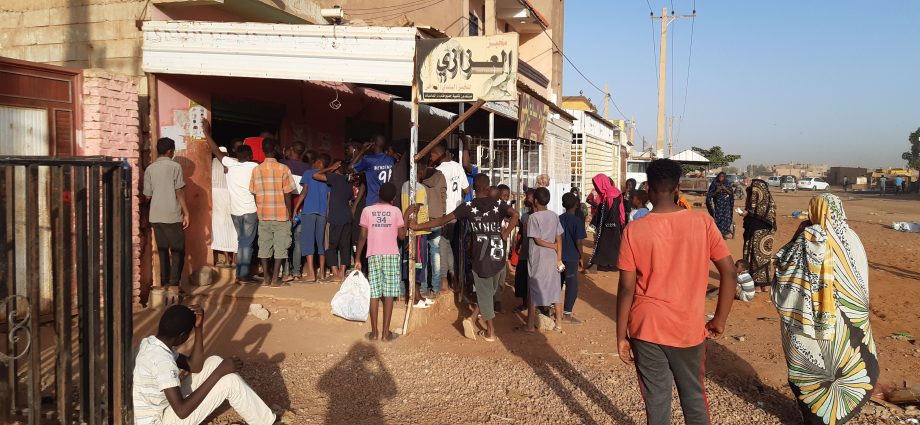
Picture No 1: queuing for bread in Quarter 50 in Omdurman. Copyright: Elsadig O. I. Elnur (April 2020). Usage authorized by the author.
Restrictive measures
It is now one year since the fall of the autocratic regime of Omer Al-Bashir and while the country’s new transitional government is hoping to sweep out the economic and war remnants of the previous government, the country encounters the threats of COVID-19. On the ground, there are various campaigns and activities taking place to contain and cope with the virus and to raise the awareness of the local communities. Paper posters are seen almost everywhere on the doors of bakeries, supermarkets, and public transportation. Short TV advertisements and broadcasts about basic protective measures are regularly presented. The Transitional Government has declared a national emergency on 17 March. As a consequence, all national borders were closed. A few days later more restrictive measures have been taken. Movements of passengers and public transportation between different states are forbidden since then. Schools and universities are closed until further notice. People are recommended to stay at their homes and avoid crowds. Hand sanitizers and masks are no longer available in drug stores. Prices are dramatically increasing. On 24 March a curfew was announced from 8 pm to 6 am local time and on 28 March the curfew hours have been extended starting already at 6 pm to 6 am. People face punishments, if they are caught during curfew hours.
In the first days of the curfew it happened that people were lashed in the streets by the police. A doctor was sent to prison by police to spend a night in jail as he was caught in the street during curfew hours. He reported he was coming from a hospital after he carried out an urgent surgery for a patient. The police paid no attention to his professional ID card and the permission letter he carries from his health sector. This incident has provoked public outcry, especially among health workers. Therefore, a new order was issued by the police allowing for doctors and all health workers to move freely even during curfew hours. On 12 April 2020 another order was issued stating possible fines (5000 or 10000 SDG) for those who break the rules.
Facing a binary risk
The country’s economy is in its worst times since decades but people’s hope for radical changes is very high since they have succeeded to bring down the autocratic regime of Omer Al-Bashir a year ago. This situation has put the Transitional Government under pressure and as the virus is hitting the country, the pressure becomes even higher. So far, a total of 19 cases tested positive and 268 suspected (Sudan News Agency, 11 April 2020). The number can increase at any time.
The government seems to be aware of this binary risk of both the economic hardship and the new deadly virus. Last Thursday 2 April 2020, the government discussed strategies and measures that were proposed by the Ministry of Health in an extra-ordinary meeting. The measures being decided upon were reported to be based on preventive and proactive steps to cope with the virus including a possibility of declaring stay-at-home orders in gradual steps, in case the number of positive cases will increase.
“There were calls for a complete lockdown but the cabinet decided that this should be done in stages as the country cannot go directly into the total lockdown due to the lack of preparedness in so many areas that we have to take into account […] so the government decided to maintain the partial lockdown and to increase the hours of the curfew in line with the spread of the disease in the country until to reach 24-hour-lockdown” the spokesman of the government Faisal Mohamed Saleh told reporters (Sudan Tribune, 7 April 2020).
On 2 April 2020, the Prime Minister Abdalla Hamdok launched a national solidarity campaign known as ‘Stand for Sudan’ calling on the Sudanese to raise donations to support the country’s economy and government’s efforts to fight the virus (500 Words Magazine, 8 April 2020).
In spite of all these efforts, it is very obvious that the majority of the population are very reckless. It seems that they are either not yet realizing the country’s vulnerability and risks or there is little trust in the government’s warnings. Also due to the economic pressure many people cannot stay at their homes or avoid crowds while they have to search for their everyday basic needs including food. Therefore, they are in a way forced to ignore the advices of the government and the ministry of health in order to survive. Daily routines at the markets and bakeries are taking place as usual. As schools are closed it is usually the case that young boys or girls are send to bakeries to buy bread at least once a day. In Sudan bread is served fresh on a daily basis and it is not kept for the next day.
Public transportation is no longer operating as usual, crowds are seen in stations waiting for transportation. Crowds of people are also seen everywhere in the markets, bakeries, mosques, banks, etc. without taking any measures to keep distance between each other.
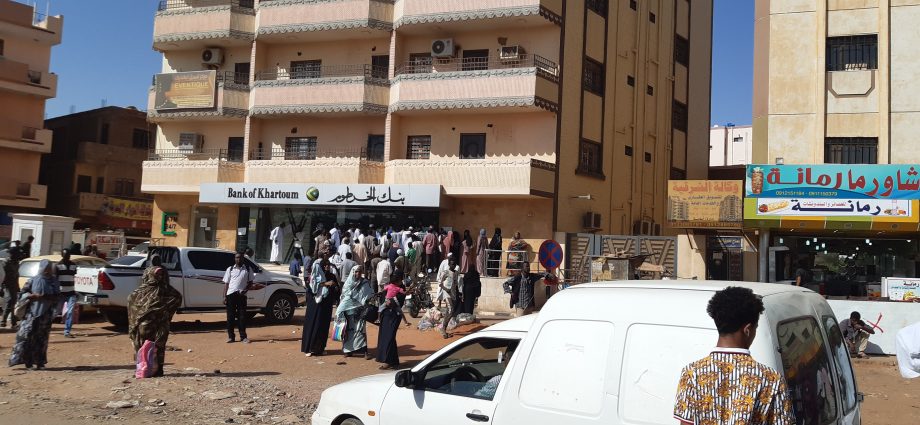
Picture No. 2: People are queueing at a branch of Bank of Khartoum in Khartoum. Copyright: Elsadig O. I. Elnur (April 2020). Usage authorized by the author.
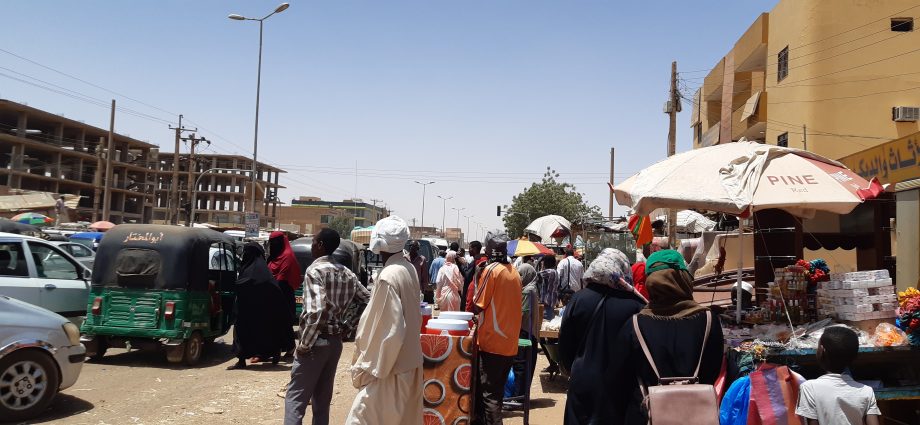
Picture No. 3: Queues: street sellers on the roadside and passengers waiting for transportation in Souq Libya in Omdurman. Copyright: Elsadig O. I. Elnur (April 2020). Usage authorized by the author.
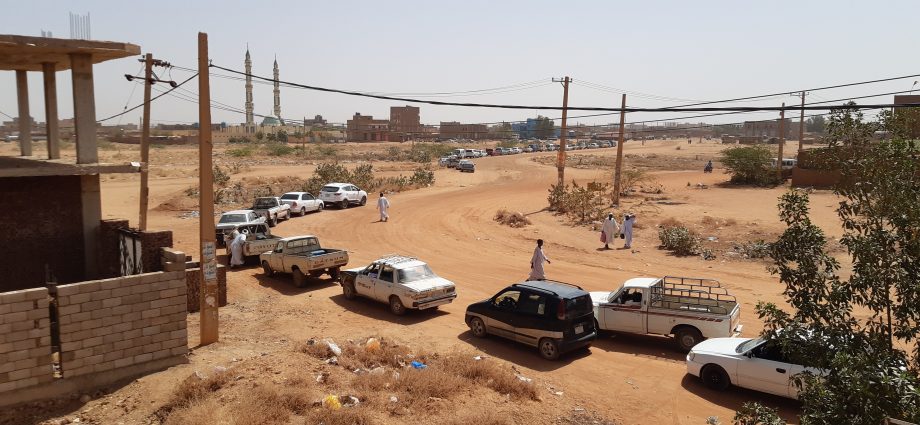
Picture No. 4: Queues of cars to get fuel in Quarter 50 in Omdurman. Copyright: Elsadig O. I. Elnur (April 2020). Usage authorized by the author.
The country is also witnessing hard fuel shortages. Long queues of trucks, buses, and cars are almost seen at every fuel station. Some people had to spend one to three days in queues in order to get fuel.
Sudan is facing a chronic fuel and bred crisis a year after the fall of the al-Bashir regime as the lengthy fuel and bread queues at bakeries and petrol stations are everywhere in the capital. Sudan Tribune 10 April 2020.
A choice between fighting corona and fighting starvation
Contrary to the government’s rules concerning meetings, a group of anti-government activists (proponents of the previous autocratic regime known as ‘The Unified Popular Movement’) were seen a week ago protesting in Khartoum against the government’s procedures taken to cope with the virus. They were demanding for economic improvements rather than focusing on the pandemic. They have also claimed that the government is taking the virus as an excuse to cover its failure to provide basic needs to the people. In a video released in the social media some of the protesters were even calling the military to overthrow the civilian led government and control power.
„If people today have the choice between dying of starvation or of coronavirus, it is better for them to die with the pandemic than living under the yoke of hunger,“ the group said. Sudan Tribune 10 April 2020.
Similar to this argument, I very often hear ordinary people say “There is no corona in Sudan because our country is hot and it cannot survive here.” When talking about COVID-19, some people bring other issues into discussion. For instance, diseases such as Malaria and Tuberculosis, malnutrition and child mortality and civil wars as all these together can cause annually thousands of deaths. For this point of view, it is more reasonable for the country to account for these issues instead of focussing all efforts on a pandemic that is beyond the country’s capacities.
Observers in Khartoum say it was not clear how the anti-revolutionary group organized its protest despite the state of health emergency in the country banning gathering and protests. Sudan Tribune 10 April 2020.
Religious interpretations
The Minister of Religious Affairs and Endowments Nasraldin Mofarah had made instructions for the wide majority of Muslims to avoid worship inside mosques as such gatherings are a suitable environment for the virus to spread. He also recommended the Imams to shorten Friday speeches. Nevertheless, it is obvious that no one is following the instructions of the minister. Some religious leaders have interpreted the government’s procedures as a step towards preventing and excluding religion from the society.
Religion has become one of the most controversial issues in the country. The question whether the country should be governed by Islamic Laws (Sharia) or a civil law is a debate since the previous autocratic government which ruled the country for almost 30 years had introduced Islamic Laws which are rooted in the Islamic ideology of the Muslim Brotherhood.
“Let us stop interrupting people’s life and pray for God to lift this pandemic […] this is a divine pandemic and it is a sign of God’s power, let us believe in God and pray to him” An Imam was addressing followers in a Friday prayer on 3 April 2020 in Masjid Al-Amal, Quarter 50 in Omdurman.
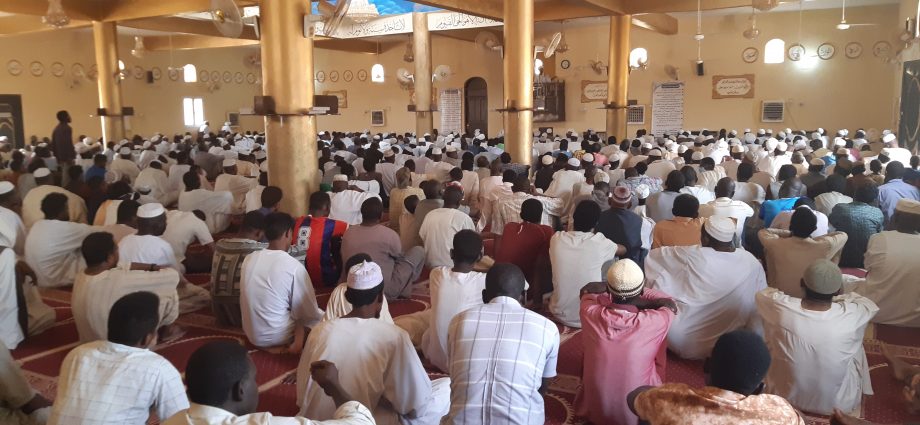
Picture No. 5: A Friday prayer gathering in Masjid Al-Amal in Quarter 50 in Omdurman. Copyright: Elsadig O. I. Elnur (April 2020). Usage authorized by the author.
Although the government has prevented public gatherings such as wedding ceremonies, festivals, sports, etc., it seems that the government is very reluctant to introduce restrictive measures concerning religious gatherings as such measures will provoke riots towards the government.
We can conclude that the situation is quite complex in Sudan. Many factors intervene with one another in the fight against corona. The economic fragility and political divergences impact on dealing or coping with COVID-19. However, there is still hope that the Sudanese people can come together hand in hand to fight this pandemic and they have yet to make a solid decision. Though, at the moment it seems the majority are not yet well informed of the danger that COVID-19 can bring to the country. This is probably due to the fact that right now people are very much concerned about the economic burdens.
Written on April 11, 2020
Elsadig Omda Ibrahim Elnur is a Lecturer at the University of Khartoum, Sudan. Currently a DAAD scholarship holder and PhD student at the Institute of General Linguistics, University of Cologne. He holds an MA degree in ‘Culture and Environment in Africa (CEA)’, University of Cologne and Bachelor degree in Linguistics, University of Khartoum. His current research project: The tonal system of Beria: focus on the Wagi dialect of Sudan. You can reach him via elsadig.omda@gmail.com
References
Sudan News Agency. 7 April 2020. Federal Health Ministry: two new cases of corona virus reported.
https://suna-sd.net/en/single?id=656849. Last access: 13 April 2020.
Sudan Tribune. 11 April 2020. Hundreds protest in Khartoum against Hamdok government.
https://www.sudantribune.com/spip.php?article69202. Last access: 11 April 2020.
Sudan Tribune. 7 April 2020. Sudan maintains partial lockdown despite eighth coronavirus case.
https://www.sudantribune.com/spip.php?article69174. Last access: 7 April 2020
500 Words Magazine. 8 April 2020. Sudan launches Stand for Sudan campaign.
http://500wordsmag.com/sudan-news/sudan-launches-stand-for-sudan-campaign/. Last access: 8 April 2020.































